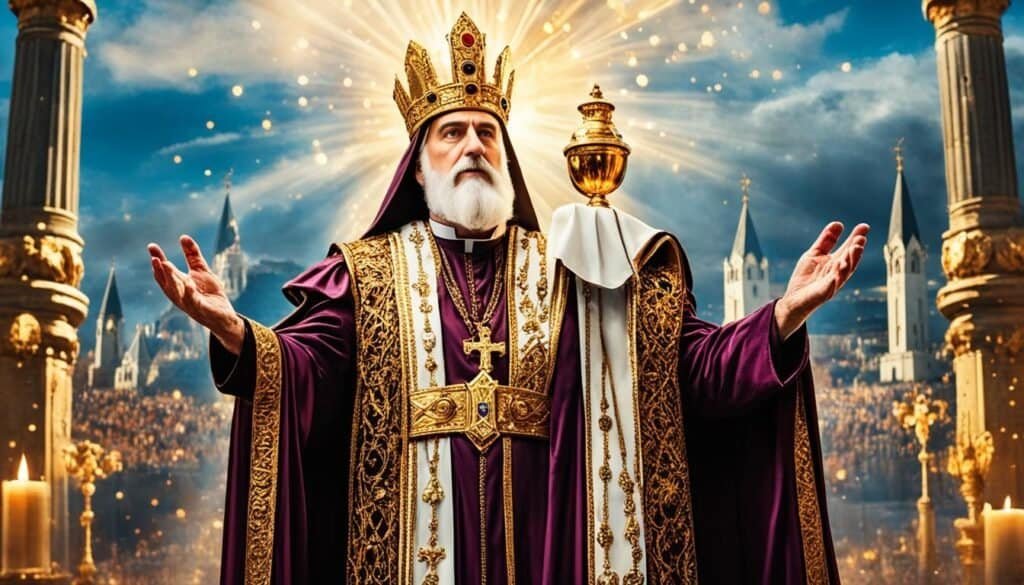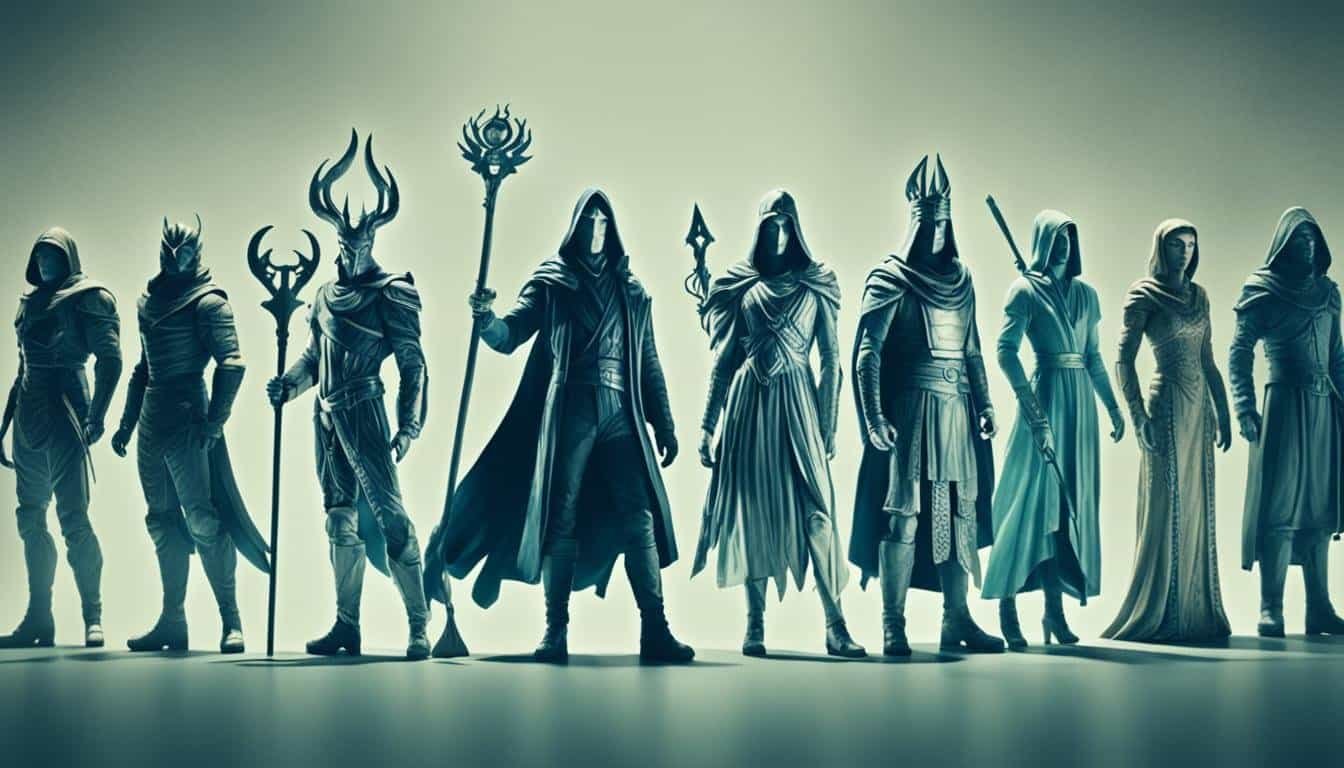In the biblical book of Genesis, we encounter a fascinating array of characters whose identities and stories are shrouded in mystery. From enigmatic beings to obscure figures, these individuals captivate our imagination and challenge our understanding.
Who were they?
What secrets do they hold? J
oin us as we embark on a journey to uncover the truth behind these perplexing personalities.
Key Takeaways:
- Genesis introduces us to numerous mysterious characters whose identities and legacies continue to perplex scholars and readers.
- The serpent in Genesis 3 raises questions about its nature, role, and symbolic significance.
- Melchizedek, the priest-king of Salem, remains a cryptic figure with Christological interpretations.
- The two angels at Sodom possess remarkable power, hinting at a greater nature than mere heavenly messengers.
- The angel of the Lord in Genesis 16 and 22 raises questions about his divine identity and purpose.
The Serpent in Genesis 3: A Misunderstood Creature?
When it comes to mysterious characters in Genesis, few captivate our curiosity like the serpent in chapter 3. This enigmatic creature plays a pivotal role in the narrative of the fall of humanity. But was it merely an ordinary snake, or is there a deeper symbolic meaning behind its existence?
The mention of the serpent in Genesis 3 has sparked countless debates among scholars and theologians. Some argue that it was a literal serpent, while others see it as a symbolic representation of Satan.
This interpretation stems from the serpent’s role in deceiving Eve and leading to the disobedience of Adam and Eve, an act often associated with Satan’s influence.
Throughout the centuries, the serpent has been seen as a mysterious creature, symbolic of Satan’s cunning nature. Its portrayal as a seductive tempter adds to the intrigue surrounding its true identity. The nuanced symbolism opens up a plethora of theological interpretations, exploring the themes of temptation, free will, and humanity’s fall from grace.
“And the serpent said unto the woman, Ye shall not surely die: For God doth know that in the day ye eat thereof, then your eyes shall be opened, and ye shall be as gods, knowing good and evil.” – Genesis 3:4-5
This passage, containing the serpent’s deceptive words, exemplifies its role as a mysterious and influential character. It sparks reflection on the nature of evil and the consequences of succumbing to its allure. The serpent’s actions in Genesis 3 cast a shadow over the rest of the biblical narrative, shaping the course of human history.
As we explore the serpent’s role in Genesis, we must remember to approach the text with reverence and an open mind. Biblical interpretations vary, and the serpent’s true nature remains shrouded in mystery. It is our goal to delve into the depths of its significance without imposing definitive conclusions.
Next, we will turn our attention to another enigmatic figure in Genesis, Melchizedek, the priest-king of Salem. Join us as we uncover the mysterious identity of this Christological figure and unravel the blessings he bestowed upon Abraham.
References:
- Genesis 3:4-5, KJV
Melchizedek: A Priest-King of Salem
One of the intriguing characters in Genesis is Melchizedek, the priest-king of Salem. Mentioned in Genesis 14:18-20, Melchizedek’s mysterious background and identity have captivated biblical scholars for centuries. Some even consider him a Christological figure, pointing to his unique role and significance in the biblical narrative.
According to Genesis, Melchizedek blessed Abraham after his successful military campaign against the kings who had captured his nephew, Lot. This act of blessing holds deep theological implications, symbolizing the superiority of Melchizedek’s priesthood over Abraham’s lineage. Notably, Melchizedek is described as both a priest and a king, a rare combination of roles in ancient times.
The name “Melchizedek” itself carries symbolic weight. It means “king of righteousness,” and his title, “king of Salem,” is often understood to mean “king of peace.” This resonates strongly with the concept of the Messiah, who is described in the New Testament as the Prince of Peace and the ultimate fulfillment of righteousness.
“Without father, without mother, without genealogy, having neither beginning of days nor end of life, Melchizedek remains a priest perpetually.” – Hebrews 7:3
The Mysterious Identity
What sets Melchizedek apart is the lack of information provided about his lineage, genealogy, or background. This silence surrounding his origins adds to the enigma surrounding his character, fueling speculation and reverence.
Some scholars propose that Melchizedek could be a Christophany, a pre-incarnate appearance of Jesus Christ in the Old Testament. The fact that he is portrayed as both a priest and a king aligns with the dual roles fulfilled by Jesus Himself. Additionally, the description in the book of Hebrews of Melchizedek having neither beginning nor end of life further strengthens this association.
Others suggest that Melchizedek could have been a historical figure, an influential king and priest of Salem, who remains shrouded in mystery due to the limited historical records available to us today. The absence of genealogical information may be intentional, emphasizing the timeless and transcendent nature of his priesthood.
Influence on Christianity
Melchizedek’s significance extends beyond the pages of Genesis. The author of the New Testament book of Hebrews draws heavily on the figure of Melchizedek to explain the superiority of Jesus Christ’s priesthood.
The comparison between Jesus and Melchizedek emphasizes the eternal and unchangeable nature of Jesus’ priesthood, contrasting it with the temporary and imperfect nature of the Levitical priesthood.

| Melchizedek | Jesus Christ |
|---|---|
| King of Righteousness | The Righteous One |
| King of Salem (Peace) | The Prince of Peace |
| Both priest and king | A priest forever |
| Without genealogy or recorded lineage | A lineage traced back to King David |
As we contemplate the mysterious identity of Melchizedek, we are reminded of the depth and richness of biblical narratives. Melchizedek’s enigmatic story invites us to explore the timeless truths hidden beneath the surface, pointing us toward the ultimate High Priest – Jesus Christ.
The Angels at Sodom: More Than Meets the Eye
Genesis 19 introduces two mysterious angels who appeared as men to Lot. Their purpose was to deliver a warning about the impending destruction of Sodom and Gomorrah. But these enigmatic figures were more than mere messengers. Their actions and words hinted at tremendous power and significance beyond what meets the eye.
The angels’ arrival in Sodom was met with great hospitality by Lot, who offered them refuge in his home. This act of kindness demonstrated the importance of hospitality in biblical culture.
However, it is their subsequent encounter with the wicked men of Sodom that truly reveals the angels’ remarkable power. In their efforts to protect Lot, they struck the crowd with blindness, highlighting their ability to exert tremendous authority.
The angels’ warnings to Lot about the impending destruction of Sodom suggest they possess tremendous power, hinting at the possibility of them being divine beings with a greater purpose.
The angels’ intentions were clear—they wanted to rescue Lot and his family before God’s judgment befell the city.
As they urged Lot and his family to flee, they revealed their knowledge of the impending destruction and emphasized the importance of speedy departure. This urgency indicated a divine sense of purpose guiding their actions.
While angels often appear throughout biblical narratives, the angels at Sodom stand out due to their combination of power, purpose, and mystery. Their ability to strike with blindness and their intimate knowledge of divine plans elevate their role beyond that of ordinary heavenly messengers.
As we continue our journey exploring the mysterious characters in Genesis, we’ll uncover more intriguing tales and enigmatic legacies. Stay with us as we dive deeper into the cryptic narratives of the Old Testament and seek to unravel their profound meanings.
The Angel of the Lord in Genesis: A Divine Enigma
The figure referred to as the angel of the Lord in Genesis 16 and 22 is both called an angel and spoken of as God Himself.
In the book of Genesis, we encounter a mysterious character known as the angel of the Lord. This enigmatic figure appears in chapters 16 and 22 and holds an ambiguous identity that intertwines the divine and the angelic.
What sets this character apart is the unique way in which they are both referred to as an angel and spoken of as God Himself. This divine representation raises intriguing questions and adds to the richness of biblical narratives.
When we first encounter the angel of the Lord in Genesis 16, we witness a remarkable interaction with Hagar, Sarai’s Egyptian maidservant. The angel of the Lord finds Hagar by a spring of water in the wilderness and brings her a message of hope and promise.
In this encounter, the angel not only speaks as a messenger of God but also claims to possess the power to multiply Hagar’s descendants exceedingly. This depiction blurs the lines between a regular angelic being and a divine entity.
Another noteworthy appearance of the angel of the Lord occurs in Genesis 22, during the testing of Abraham’s faith. As Abraham prepares to sacrifice his son Isaac, the angel of the Lord intervenes, providing a ram caught in a thicket as a substitute.
In this profound moment, the angel speaks with divine authority, swearing by Himself and reaffirming the promise made to Abraham. This divine representation further deepens the mystery surrounding the identity of the angel of the Lord.
| Key Points of the Angel of the Lord in Genesis |
|---|
| The angel of the Lord is referred to as both an angel and God Himself. |
| This divine representation adds ambiguity to the character’s identity. |
| The angel of the Lord brings messages of hope, promise, and divine intervention. |
| These appearances blur the lines between angelic beings and divine entities. |
| The character’s significance lies in their unique role as a divine intermediary. |
The angel of the Lord in Genesis challenges our understanding of traditional angelic figures and calls us to explore the depths of divine representation.
While their precise identity remains ambiguous, the significant role they play as a divine intermediary cannot be denied. Through their appearances, the angel of the Lord conveys messages of hope, promise, and divine intervention, inspiring awe and curiosity.
As we continue our journey through Genesis, let us embrace the enigma of the angel of the Lord and uncover the profound truths they reveal about the intersection of the divine and the angelic.
The Unnamed Servant: Faith and Wisdom Without a Name
In Genesis 24, we encounter a fascinating character who, despite his significant role, remains unnamed throughout the story. Abraham’s servant, entrusted with the crucial task of finding a suitable wife for Isaac, exemplified remarkable faith and wisdom in his pursuit.
As we journey through the narrative, we witness the servant’s unwavering commitment to fulfill his master’s request. With a heart full of faith, he sets out on a long and uncertain journey, carrying precious gifts and a humble prayer.
His trust in God’s guidance is evident as he utters, “The Lord, the God of my master Abraham, please grant me success today.”
“O Lord, God of my master Abraham, if you will, please grant me success today and show steadfast love to my master Abraham.”
Guided by faith, the servant seeks a sign from God—a young woman who would offer him and his camels water at the well. He witnesses God’s providence when Rebekah, showing kindness and generosity, fulfills the servant’s prayer with remarkable timing.
Throughout the entire episode, the servant demonstrates wisdom and careful judgment. He devises a plan to test Rebekah’s character, ensuring her suitability as Isaac’s bride. His contemplative and strategic approach highlights not only his shrewdness but also his deep understanding of the importance of integrity and compatibility in such a significant union.
In this nameless servant, we witness the power of faith and wisdom, transcending the need for personal recognition. His story serves as a testament to the profound impact individuals can have, even when their names are forgotten.
Join us as we explore the captivating tale of the unnamed servant, delving into the nuances of his character and uncovering valuable insights about faith, wisdom, and the extraordinary ways God works through ordinary individuals.

Stay tuned as we continue our journey through Genesis, unraveling the enigmatic mysteries and discovering the profound spiritual truths embedded within these ancient texts.
Nephilim: The Mighty Men and Heroes of Old
In the book of Genesis, a fascinating group of individuals known as the nephilim capture our attention. These mysterious figures are mentioned in Genesis 6:4 and referred to as the “fallen ones.”
They are said to be the offspring of the “sons of God” and human women, possessing extraordinary strength and prowess. Let’s delve into the legends and myths surrounding these intriguing characters.
The nephilim were considered mighty men and heroes of old, displaying unparalleled power and abilities. Their incredible strength set them apart from ordinary humans, making them legendary figures in ancient tales. These enigmatic beings were known for their larger-than-life presence and remarkable feats.
“The nephilim were renowned throughout the land for their unmatched strength and dominance. They towered above ordinary mortals, their stature imposing and commanding respect.”
These mysterious fallen ones have fascinated scholars and theologians for centuries, sparking debates and interpretations about their true nature. Some believe them to be angelic beings who descended from heaven, while others consider them to be symbolic representations of the corruptive influence of human desires.
The nephilim’s existence raises profound questions about the boundaries between the human and divine realms, leaving us to ponder their significance in biblical narratives. Were they divine emissaries or fallen angels? What role did they play in shaping the course of human history?
The Legacy of the Nephilim
The nephilim’s legendary stature and exploits left an indelible mark on ancient civilizations. Stories of their might and heroism spread, becoming intertwined with the mythology and folklore of various cultures. Across different civilizations, the legends of these ancient heroes have been passed down through generations, captivating imaginations and fueling curiosity.
- They were revered as demigods and superheroes in ancient Mesopotamian and Greek mythology, often depicted as godlike beings with incredible strength and supernatural abilities.
- The Canaanite civilization believed them to be giants who inherited their superhuman traits from their divine lineage.
- Legends from ancient Egypt depict these powerful beings as gods who walked among humanity, shaping the destiny of nations.
While the origins and true nature of the nephilim remain shrouded in mystery, their enduring presence in ancient mythology highlights their lasting impact on human imagination and storytelling.

The Nephilim: Fact or Fiction?
Despite their enigmatic status, the nephilim continue to captivate and intrigue us today. Their stories offer insights into humanity’s fascination with extraordinary abilities and our enduring interest in the blurred boundaries between the mortal and divine realms.
As we continue our exploration of Genesis, we will encounter more captivating characters and delve deeper into the rich tapestry of biblical mysteries and legends. Stay tuned as we unravel the fascinating tales woven within the pages of this ancient text.
Keturah: The Mysterious Wife of Abraham
As we explore the intriguing characters in the book of Genesis, we come across the enigmatic figure of Keturah, who is mentioned as one of Abraham’s wives in Genesis 25:1. Despite her significant role in Abraham’s life, Keturah remains a mysterious and lesser-known biblical figure with a background shrouded in uncertainty.
While the Bible does not provide detailed information about Keturah’s origins or her life before marrying Abraham, her impact on the narrative cannot be overlooked. After the death of his first wife, Sarah, Abraham marries Keturah and she becomes the mother of six sons, expanding Abraham’s lineage even further.
The lack of specific details about Keturah’s background has led to speculation and curiosity surrounding her true identity. Some theologians and scholars propose various theories, linking her to different regions and peoples. However, these theories remain speculative, as the Bible does not offer explicit clues about her mysterious past.
Despite the mystery surrounding Keturah, her presence in the story of the patriarchs highlights her significance and role in the lineage of Abraham. Her sons would go on to have their own descendants, contributing to the formation of nations.

Intriguingly, Keturah’s inclusion in the biblical narrative reminds us that there are often untold stories and hidden figures within the pages of history. While we may not have all the answers about Keturah and her mysterious background, her presence serves as a reminder of the complexity and richness of the biblical narrative.
| Sons of Keturah | Meaning of Names |
|---|---|
| Zimran | Praised |
| Jokshan | Increase |
| Medan | Quarrel |
| Midian | Strife |
| Ishbak | Empty |
| Shuah | Abundance |
While their names provide possible insights into the circumstances or characteristics associated with Keturah’s life, the full story of this intriguing woman may forever remain a mystery. Nevertheless, her role as Abraham’s wife and mother to his sons adds depth and intrigue to the biblical narrative.
Rachel’s Mandrakes: Symbolic Powers Lost to Time
In the book of Genesis, an intriguing anecdote unfolds in Genesis 30:14-16, shedding light on Rachel and Leah’s fascination with mandrakes.
These fertility plant-roots captured their attention, igniting curiosity about their symbolic powers. Sadly, the true meaning and significance of the mandrakes have been lost over time, leaving us to ponder their enigmatic nature.
The mention of mandrakes in Genesis sparks our curiosity, as these plant-roots held a symbolic allure for Rachel and Leah. The desire to possess these mandrakes suggests that they were considered to possess inherent qualities or powers that held significance for fertility or other aspects of life.
Genesis 30:14-16 (NIV): “During wheat harvest, Reuben went out into the fields and found some mandrake plants, which he brought to his mother Leah. Rachel said to Leah, ‘Please give me some of your son’s mandrakes.’
But she said to her, ‘Wasn’t it enough that you took away my husband? Will you take my son’s mandrakes too?’ ‘Very well,’ Rachel said, ‘he can sleep with you tonight in return for your son’s mandrakes.'”
The significance of mandrakes in this biblical story remains a mystery. It is unclear how Rachel and Leah perceived the symbolic powers or properties these fertility plant-roots were believed to possess. Nevertheless, their desire to obtain the mandrakes showcases the intrigue surrounding these enigmatic objects.
Throughout history, mandrakes have been associated with various beliefs and myths, often linked to fertility, love, luck, and even mystical powers.
The roots of the mandrake plant were sought after for their perceived magical properties by different cultures across the world. However, the precise symbolism and meaning attributed to mandrakes in the context of Rachel and Leah’s narrative remain elusive.
The mention of mandrakes in Genesis 30:14-16 provides a glimpse into the cultural and symbolic significance of these plant-roots during ancient times. However, the exact nature of their symbolic powers and the reasons behind Rachel and Leah’s interest in them remain shrouded in mystery.
As we explore the intriguing stories and characters of Genesis, the tale of Rachel’s mandrakes stands as a testament to the enigmatic qualities that permeate biblical narratives. While we may never fully unveil the symbolic powers behind the mandrakes, their presence adds another layer of mystery to the rich tapestry of Genesis.
The Symbolic Meaning of Mandrakes
Though the symbolism of mandrakes in the story of Rachel and Leah remains uncertain, it is worthwhile to consider the broader meaning attributed to mandrakes in various cultural, historical, and mythological contexts.
Mandrakes have been linked to fertility and childbirth in many ancient beliefs. The shape of its root, resembling the human form, led to the belief that the mandrake possessed magical properties associated with procreation and enhancing fertility.
In ancient Near Eastern cultures, mandrakes were often seen as a symbol of love and passion. They were believed to possess aphrodisiac qualities, capable of igniting desire between lovers.
The association of mandrakes with luck and protection can also be found in different mythologies. These plant-roots were believed to bring good fortune and ward off evil spirits, making them valuable in various cultural practices.
While the exact symbolism of mandrakes in the biblical narrative of Rachel and Leah remains open to interpretation, their presence sparks curiosity and invites us to contemplate the mysteries woven within the ancient text.
Mandrakes in Modern Times
In modern times, the symbolic powers once attributed to mandrakes have largely been relegated to myth and folklore. The understanding of the plant’s properties has evolved, and scientific explanations have replaced fantastical beliefs.
Today, the mandrake plant (Mandragora officinarum) is primarily known for its historical significance rather than its mystical properties. Its roots, once sought-after for their perceived magical qualities, are now primarily viewed as a fascinating part of botanical and historical study.
While Rachel’s mandrakes may remain forever elusive in their symbolism and meaning, their presence in the biblical account serves as a reminder of the mysterious and captivating elements that enrich the stories of Genesis.
The Blood Avenger: Ancient Practices Revealed
In Genesis 4:15, we encounter a captivating reference to a blood avenger, a mysterious figure who seeks fatal vengeance against Cain. This enigmatic character and the ancient practices associated with personal reprisals provide intriguing insights into the customs and beliefs of that time.
“If anyone kills Cain, vengeance shall be taken on him sevenfold”
This declaration by God, as He marks Cain to protect him from the blood avenger, raises countless questions about the nature and prevalence of such practices in ancient societies.
The concept of the blood avenger was prevalent in many ancient cultures, where the responsibility of seeking retribution for a slain family member fell upon the closest relative. This practice highlights the importance placed on blood ties and the duty to uphold justice.
The role of the blood avenger extended beyond mere vengeance. They were seen as the instrument through which divine justice was executed, ensuring the balance between right and wrong in the community.
While the specifics of these ancient practices may remain shrouded in mystery, their presence in Genesis provides a glimpse into the social and legal structures of the time.
The Significance of Divine Protection
God’s act of marking Cain carries symbolic weight. It illustrates His divine authority and protection, as well as His role as the ultimate arbiter of justice.
This act also serves as a warning to potential blood avengers, indicating that any harm brought upon Cain would incur severe consequences. God’s intervention demonstrates His overarching sovereignty and commitment to maintaining order in the world.
The mark on Cain becomes a poignant reminder of the complex relationships between humans and divine beings, shaping the narrative of Genesis and laying the foundation for future biblical concepts.
Uncovering Ancient Practices
While the exact details of the blood avenger’s role and the intricacies of ancient practices may be lost to time, the biblical reference stimulates intrigue and prompts us to delve deeper into the cultural contexts of the ancient world.
By exploring historical records, anthropological studies, and comparative analyses of ancient civilizations, we can gain a better understanding of the societal structures and beliefs that underpin the narratives found in Genesis.
As we journey through the pages of Genesis, we are invited to contemplate the fascinating characters and their connections to the historical and cultural landscapes of the ancient Near East.
| Ancient Practices Revealed | Mysterious Figures Unveiled |
|---|---|
| Blood Avenger Customs | Ambiguous Identities |
| Divine Justice in Action | Enigmatic Roles |
| The Interplay of Human and Divine | Cultural Significances |
The Mothers of Nations: Obscure Identities
In Genesis 25 and 36, we encounter various wives and concubines who played significant roles in shaping the future as the mothers of nations. Despite their importance, their identities remain obscure. Let’s explore the intriguing stories of these women and their enigmatic contributions.
One prominent figure among these mothers of nations is Keturah, mentioned in Genesis 25:1. Although her background and origins are shrouded in mystery, she bore six sons to Abraham after Sarah’s death. These sons would later become the ancestors of neighboring nations.
Delving further into Genesis 36, we discover additional concubines and wives who bore sons that became the forefathers of nations such as Edom, Midian, and Sheba. Their names and backgrounds, however, remain obscure, leaving us with a sense of intrigue and curiosity.
These women, through their offspring, contributed to the diverse tapestry of nations found throughout biblical history. Their obscurity adds an air of mystique to their narratives.
While the identities of these mothers of nations may be hidden, their impact on history and their significance as essential characters within the biblical narrative cannot be denied. Through them, God’s plan of fulfilling His promises and multiplying Abraham’s descendants was set into motion.
Mothers of Nations: A Table of Obscure Identities
| Character | Genesis Reference |
|---|---|
| Keturah | Genesis 25:1 |
| Unnamed wives and concubines | Genesis 36 |
As we reflect on the mysterious identities of these women, we are reminded of the complexity and richness of the biblical narrative. Their stories offer glimpses into the diverse tapestry of human history and the ways in which God’s promises were fulfilled.
In the next section, we will uncover yet another enigmatic character in Genesis and explore the significance of their presence in the biblical narrative.
Are the Mysterious Characters in Genesis Connected to the Genealogies Traced in the Book?
The mysterious characters in Genesis have puzzled scholars for centuries. Some believe they are connected to the genealogies traced in Genesis, pointing to a deeper significance. Others argue they are purely symbolic. Regardless, their enigmatic nature continues to captivate readers and spark lively debates among theologians.
Unveiling the Enigmas of Genesis
Throughout our exploration of the book of Genesis, we have encountered a plethora of enigmas and mysteries presented by its cast of mysterious characters. From the serpent in Genesis 3 to the unnamed servant in Genesis 24, these figures have left us with cryptic legacies that continue to intrigue and enthrall.
As we reflect on our journey, we can’t help but marvel at the breadth of these biblical mysteries. The enigmas of Genesis encompass the enigmatic figures, their inexplicable actions, and the profound symbolism surrounding them. Each character invites us to delve deeper into their stories, offering glimpses into ancient practices, divine representation, and even the implications for Christology.
It is through the exploration of these mysteries that we gain a deeper understanding of the complex and multifaceted nature of the biblical narrative. They challenge us to question our assumptions, spark our curiosity, and inspire new avenues of interpretation.
As we conclude our journey through the enigmas of Genesis, we are reminded of the timeless allure of these mysterious characters. Their stories continue to captivate and provoke contemplation, leaving us with a profound appreciation for the profound depths of biblical storytelling.
Affiliate Disclosure: "As an Amazon Associate I earn from qualifying purchases made from links in this post. We are a participant in the Amazon Services LLC Associates Program, an affiliate advertising program designed to provide a means for us to earn fees by linking to Amazon.com."

